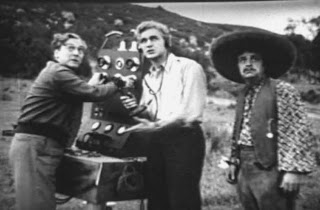Starring: Mary Pickford, Arthur V. Johnson, George Nichols, and William Beaudine
Director: D.W. Griffith
Rating: Seven of Ten Stars
A beautiful young woman with an equally beautiful voice (Pickford) is put onto the path of a successful showbusiness career after a chance encounter with a theatrical producer (Nichols). A young pastor in her hometown (Johnson) is in love (or maybe just in lust) with her, and he follows her to the big city, in hopes of convincing her to return with him.
I generally don't have the patience for silent dramas, because the pacing combined with the overwrought performance styles and melodramatic pantomiming used by the actors to communicate emotions either bore me or make me laugh.
A notable exception are short films from D.W. Griffith. Every one of them I've seen so far has moved along at a breakneck pace and has been augmented by staging and framing of scenes that are at the same time reminiscent of renaissance paintings and modern-feeling. Griffith was one of the early masters of the cinematic medium, and that's what makes his short films entertaining to this day.
"To Save Her Soul" is no exception. It clips along at a quick pace. While there's plenty of overly dramatic emoting and even some overacting, the two leads--Pickford and Johnson--have enough presence and charisma that their screen presence shines through that. Pickford is, as always, excellent in her part.
With that said, I'm going to break format and present "To Save Her Soul" for your viewing pleasure here in the middle of this post instead of at the end. This is because the rest of this review reveals the film's ending and thus may spoil it for you.
The story of "To Save Her Soul" is fairly engaging... and it becomes even more so when the handsome lead makes a transition from a concerned would-be suitor to the young singer to a crazed stalker and religious fanatic who is going to murder her, ostensibly to save her soul (as the title implies) but more basically because if he can't possess her completely and wholly, she cannot be allowed to live.
But, ultimately, that character transition is what undoes this movie. Instead of treating the pastor like the vicious monster that he is, the film sets him up as a literal savior: After he literally points a gun at Pickford's character's face and threatens to murder her if she doesn't surrender to his whims and desires (and his whims and desires alone), the young woman surrenders to him completely, leaving behind the life of sinful showbusiness to be his sex slave before the Lord Jesus Christ.
Okay, I probably put a far darker spin on the film's final moments than Griffith intended, but the ending of "To Save Her Soul" is seriously messed up. Even when allowing for more than a century of shifting social standards, the "hero" of this film should have been a villain that one of the show biz folk wrestled with, and ultimately shot with his own gun. That is how this film should have ended, and I would have given it Eight or Nine Stars.
























.jpg)






.jpg)
